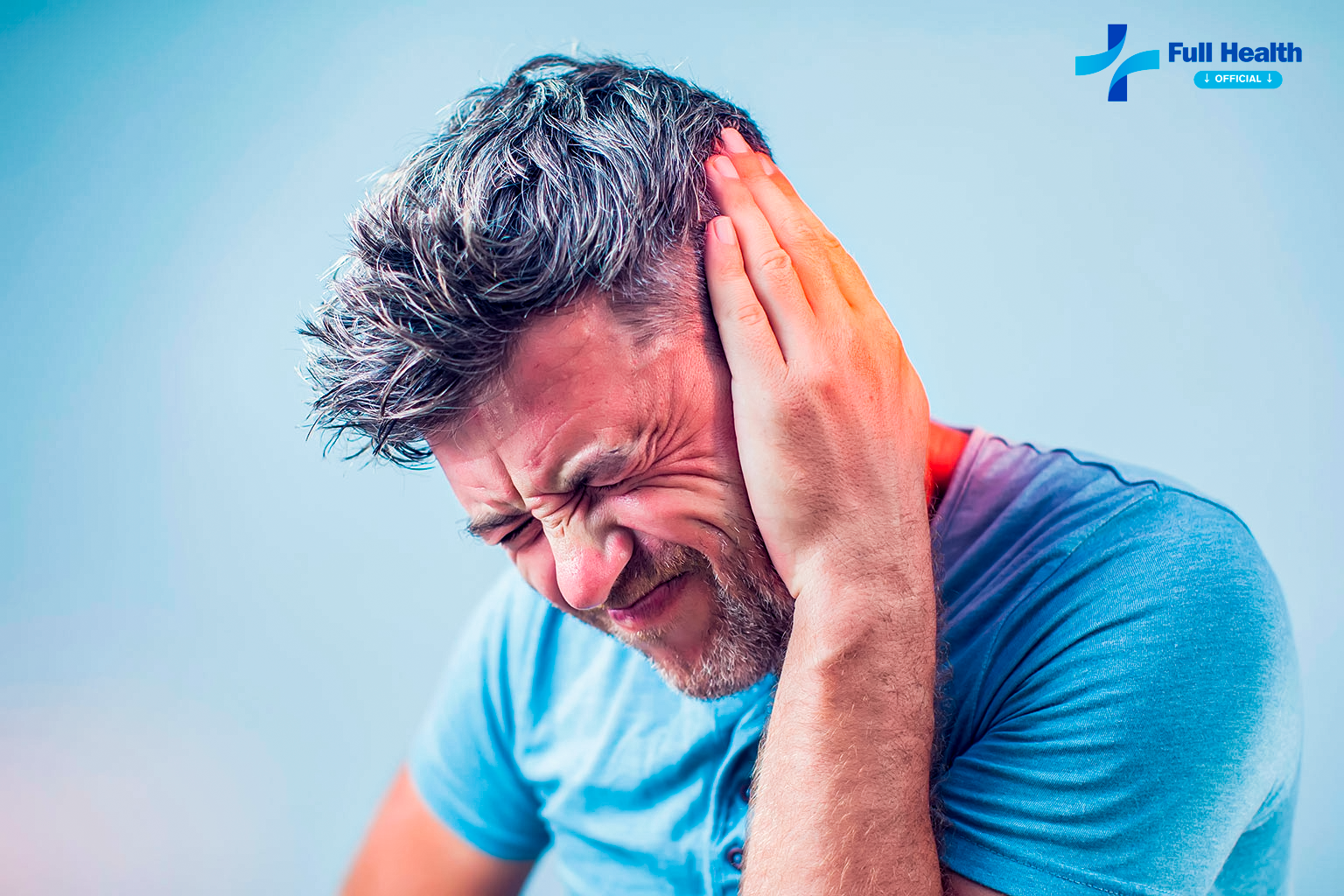Tinnitus, Commonly known as ringing in the ears, is a condition that affects millions of people worldwide. Characterized by the perception of sounds without an external source, Tinnitus can range from mild discomfort to a debilitating problem, significantly impacting quality of life.
In this article, we will explore what Tinnitus is, its causes, symptoms, diagnosis, and the available treatment options. Additionally, we will discuss how can affect mental health, the importance of prevention, and technological innovations in treatment.If you are looking to better understand this condition and find effective strategies to cope with Tinnitus, continue reading for detailed and practical information.

📜Contents
- 1 What is Tinnitus? 🤔
- 2 Symptoms and Diagnosis 🤒
- 3 Treatments for Tinnitus 🧪
- 4 Natural Supplement for Auditory Health 🍃
- 5 Impact of Tinnitus on Quality of Life ❤️🩹
- 6 Prevention and Care 🛡️
- 7 Tinnitus and Technology 📌
- 8 Tinnitus During the COVID-19 Pandemic 🧬
- 9 Tinnitus in Different Age Groups 👶
- 10 Tinnitus and Mental Health 🎯
- 11 Future Perspectives in Tinnitus Treatment 👨⚕️
- 12 Conclusion 💥
- 13 Also Read – More Posts💡
What is Tinnitus? 🤔
Definition and Concept of Tinnitus
- Tinnitus, or ringing in the ears, is the perception of sounds that have no external source. These sounds can vary from a mild hiss to a loud and continuous ringing, affecting the quality of life of those who experience them. While it can occur at any age, it is more common in adults and the elderly. Tinnitus is not a disease itself but a symptom of other underlying conditions, such as hearing loss, exposure to loud noises, or circulatory problems.
Common Causes
Several factors can contribute to the development. Prolonged exposure to loud noises, such as in industrial work environments or concerts, is one of the main causes.
Age-related hearing loss, known as presbycusis, can also lead to Tinnitus.
Other causes include ear infections, wax buildup, changes in the bones of the middle ear, and more serious conditions like tumors or vascular problems. Identifying the exact cause is essential for determining the most appropriate treatment.

Symptoms and Diagnosis 🤒
Symptoms
Tinnitus manifests in various forms, with patients reporting different types of sounds, such as ringing, whistling, hissing, or roaring.
These sounds can be constant or intermittent and vary in volume.In addition to the perceived sounds, Tinnitus can cause irritability, concentration difficulties, and sleep problems, leading to a significant impact on daily life. Recognizing these symptoms early is crucial to starting effective treatment.
Diagnosis
The diagnosis of begins with a detailed evaluation of the patient’s medical and auditory history.
Hearing tests, such as audiometry, are often used to measure hearing acuity and identify possible causes.Additional tests may include imaging exams, such as magnetic resonance imaging (MRI) or computed tomography (CT), to rule out structural or neurological causes. The evaluation may also involve specific questionnaires to better understand its impact on the patient’s quality of life.

Treatments for Tinnitus 🧪
Available Treatments
Although there is no definitive cure, various treatments can help manage the symptoms. Sound therapy, which involves exposure to relaxing sounds or white noise, can mask the ringing and provide relief. Hearing aids are recommended for those with concurrent hearing loss, as they can amplify external sounds and reduce the perception of Tinnitus.
In specific cases, medications such as antidepressants or anxiolytics may be prescribed to alleviate associated discomfort, or even the use of natural supplements like ZenCortex, which we will discuss below.
Alternative Approaches
In addition to conventional treatments, many people seek alternative approaches to relieve Tinnitus symptoms. Acupuncture, for example, has been explored by some patients as a way to alleviate the ringing.
Meditation and mindfulness techniques are also used to help reduce stress and anxiety, which can exacerbate. Dietary changes, such as reducing caffeine, alcohol, and sodium-rich foods, may, in some cases, minimize symptoms.
Natural Supplement for Auditory Health 🍃
ZenCortex is a 100% natural supplement, manufactured in the USA, with a formula enhanced and optimized by research, combined in precise proportions necessary to support healthier hearing.
Impact of Tinnitus on Quality of Life ❤️🩹
Psychological Effects
Tinnitus can have a profound impact on mental health. Patients often report feelings of anxiety, depression, and frustration due to the constant presence of ringing. Sleep disruption and difficulty concentrating are common issues that can lead to a cycle of stress and worsening symptoms. It is important to recognize the psychological impact and address these aspects in treatment.
Strategies for Coping with Tinnitus
To improve the quality of life for those suffering from Tinnitus, it is essential to adopt effective management strategies. Relaxation techniques such as deep breathing and yoga can help reduce stress. The use of hearing aids with sound masking features can be beneficial, as well as engaging in activities that distract from the ringing. Regular consultations with an auditory health professional are also recommended to monitor and adjust treatment as necessary.

Prevention and Care 🛡️
How to Prevent
Preventing Tinnitus primarily involves protecting against the factors that can trigger it. Avoiding prolonged exposure to loud noises is crucial, and the use of ear protection in noisy environments is highly recommended.
Maintaining a healthy lifestyle, with a balanced diet and control of medical conditions such as hypertension, can also help prevent. Taking care of hearing health at all stages of life is an important preventive measure.
Ongoing Care for Those Who Already Have Tinnitus
For those who already suffer from Tinnitus, it is essential to maintain regular follow-up with an otolaryngologist or audiologist. Adherence to the recommended treatment, whether it is medicinal, therapeutic, or a combination of both, is crucial for symptom control. Keeping a journal to record symptom variations can help identify potential triggers and adjust treatment as necessary.

Tinnitus and Technology 📌
Technological Innovations for Treatment
- Technology has played a vital role in developing new approaches to Tinnitus treatment. Hearing devices with advanced sound masking technologies are becoming increasingly sophisticated, offering personalized relief for patients. Additionally, research into neurofeedback and transcranial electrical stimulation is exploring new ways to treat at the brain level, offering hope for more effective treatments in the future.
Apps and Devices for Managing Tinnitus
- With the advancement of mobile technology, various apps have been developed to help patients manage Tinnitus. These apps can offer relaxing sounds, symptom monitoring, and guided meditation techniques to help reduce the impact. Portable devices that emit white noise or therapeutic sounds are also an option for those seeking relief throughout the day.

Tinnitus During the COVID-19 Pandemic 🧬
Impact of the Pandemic
The COVID-19 pandemic has brought additional challenges for those suffering from Tinnitus. Increased stress levels, social isolation, and changes in work habits have exacerbated symptoms in many patients. Additionally, some cases have been reported as a possible consequence of COVID-19 infection, although research is still ongoing to understand this correlation.
Changes in Treatment During the Pandemic
During the pandemic, access to traditional Tinnitus treatments was limited, leading to adaptations in treatment approaches.
Telemedicine became a valuable tool for follow-up consultations, allowing patients to continue receiving guidance and support from their healthcare providers. The implementation of remote therapies, such as online cognitive-behavioral therapy sessions, also proved effective in managing during this challenging period.

Tinnitus in Different Age Groups 👶
In Young People and Adults
- Tinnitus does not discriminate by age, affecting anyone. In young people, exposure to loud noises through headphones or at musical events is a common cause. For adults, in addition to noise, factors such as stress and medical conditions like hypertension can be triggers. Awareness and education about auditory risks are essential to prevent Tinnitus in younger generations.
Tinnitus in the Elderly
- In the elderly, Tinnitus is often associated with age-related hearing loss. Presbycusis, or natural age-related hearing loss, is one of the main causes in this age group. Treatment for the elderly may include specific hearing aids that help amplify external sounds and reduce the perception of ringing. Careful management of other health conditions that may worsen Tinnitus is equally important.

Tinnitus and Mental Health 🎯
Relationship Between Tinnitus and Psychological Conditions
Tinnitus is closely linked to mental health issues. The constant presence of unwanted sounds can lead to the development of anxiety disorders, depression, and, in severe cases, may contribute to suicidal ideation. Understanding this relationship is vital for effective treatment, and integrated approaches that include psychological support are often necessary.
Psychological Strategies
Cognitive-behavioral therapy (CBT) is one of the most effective strategies to help patients cope with the emotional impact. This therapeutic approach helps restructure thoughts and behaviors related to the ringing, reducing its interference in daily life. Mindfulness and relaxation techniques can also be incorporated to improve overall well-being and help manage the stress associated with Tinnitus.

Future Perspectives in Tinnitus Treatment 👨⚕️
New Research and Advances in Tinnitus Treatment
- Ongoing research is exploring new ways to treat, including therapies based on genetics and neuroscience. Studies on neural modulation and new stimulation techniques are promising for offering more effective and lasting solutions for treatment.
Future Trends
- Future trends in Tinnitus treatment include personalized care, with more specific treatments based on individual patient characteristics. The integration of new technologies and multidisciplinary approaches promises to transform Tinnitus management, offering more innovative options tailored to patients’ needs.

Conclusion 💥
Tinnitus is a complex condition that can deeply impact quality of life, but understanding its causes, symptoms, and treatment options is the first step in addressing the problem.
With advances in technology and new therapeutic approaches, there is hope for those suffering from this disorder. It is essential to adopt preventive measures, seek continuous medical follow-up, and explore different strategies to manage symptoms effectively.
Hearing health is essential for overall well-being, and taking care of it is a valuable investment in your quality of life. Thank you for reading and learning about Tinnitus!
Also Read – More Posts💡






[…] Tinnitus: The Buzzing That Never Stops – Understand and Learn to Eliminate It […]
[…] Tinnitus: The Buzzing That Never Stops – Understand and Learn to Eliminate It […]